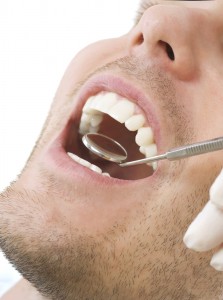Here at Long Family Dental, we have seen several patients this summer with rampant decay. When asking the patients about some of their dietary habits, one common thread is apparent: Sipping on sugary drinks throughout the day.
Now, for years most dentists have expressed concerns about too much sugar in a diet and how that can negatively impact the health of teeth. The truth is dentists are not anti-sugar! It’s how you consume sugar that has a large impact on your teeth.
Having a soda or Gatorade or energy drink is not the problem. Sipping on it all day long is the problem. If you crave a sugary drink, have one with a meal, or all in one setting, and then stop. It’s having the sugar and acid constantly in the mouth all day, little sips at a time that is wreaking havoc and causing massive decay, in some cases on every tooth!
If you must sip on something all day, make it water! Not only is that healthy for your teeth, but has many other health benefits as well!

 Are you unhappy with the appearance of your teeth? Are small flaws detracting from your smile? Your dentist can help with cosmetic dental bonding. This is a cosmetic dentistry treatment that can revitalize your smile.
Are you unhappy with the appearance of your teeth? Are small flaws detracting from your smile? Your dentist can help with cosmetic dental bonding. This is a cosmetic dentistry treatment that can revitalize your smile. Many times, patients feel that if they’re brushing and flossing their teeth at home then there’s no need to visit their dentist for their dental checkup appointments. Unfortunately, this really isn’t the case. By neglecting your dental checkups, you’re putting your smile at risk.
Many times, patients feel that if they’re brushing and flossing their teeth at home then there’s no need to visit their dentist for their dental checkup appointments. Unfortunately, this really isn’t the case. By neglecting your dental checkups, you’re putting your smile at risk. Many people have dental insurance, which is a great thing to have and helps make your dental care more affordable. However, dental insurance is not insurance in the same way as health or life insurance. It’s probably more accurately described as a dental benefit.
Many people have dental insurance, which is a great thing to have and helps make your dental care more affordable. However, dental insurance is not insurance in the same way as health or life insurance. It’s probably more accurately described as a dental benefit. If you’re suffering from a toothache, it’s important to give your dentist a call right away. If the pain is persistent, you might need root canal therapy to treat the infection inside of your tooth. An infected tooth is a serious threat to your dental health and should be addressed as soon as possible.
If you’re suffering from a toothache, it’s important to give your dentist a call right away. If the pain is persistent, you might need root canal therapy to treat the infection inside of your tooth. An infected tooth is a serious threat to your dental health and should be addressed as soon as possible. If you have a tooth that is broken, cracked or weakened, it’s important to repair it to maintain the health of your smile. Often a filling will be used. In cases where the damage is more extensive, your dentist will use a crown to restore your tooth.
If you have a tooth that is broken, cracked or weakened, it’s important to repair it to maintain the health of your smile. Often a filling will be used. In cases where the damage is more extensive, your dentist will use a crown to restore your tooth. Are you disappointed with your smile when you look in the mirror? Do you find yourself wishing your teeth were whiter, straighter, or just more perfect? Luckily, your dentist has a solution for you. Porcelain veneers are a great cosmetic dentistry procedure than can have a positive impact on your smile.
Are you disappointed with your smile when you look in the mirror? Do you find yourself wishing your teeth were whiter, straighter, or just more perfect? Luckily, your dentist has a solution for you. Porcelain veneers are a great cosmetic dentistry procedure than can have a positive impact on your smile.